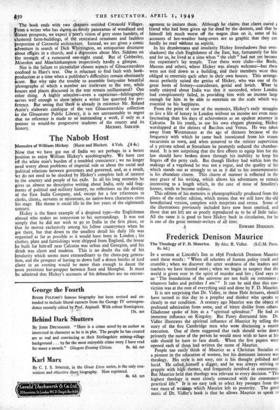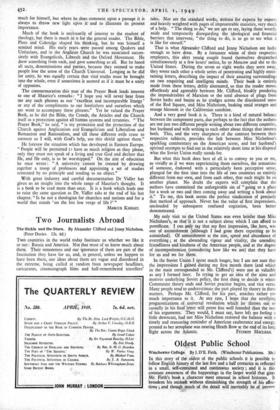Frederick Denison Maurice
IN a sermon at Lincoln's Inn in 1856 Frederick Denison Maurice used these words: " When all schemes of human policy crack and crumble ; when we discover the utter weakness of the leaders and teachers we have trusted most ; when we begin to suspect that the world is given over to the spirit of murder and lies ; God says to us ' The foundations of the universe are not built on rottenness ; whatever fades and perishes I am.' " It can be said that this con- viction was at the root of everything said and done by F. D. Maurice.
It is not surprising that Dr. Vidler, in these Hale lectures, should have turned in this day to a prophet and thinker who speaks so clearly to our condition. A century ago Maurice was the object of profound admiration from some, and of bitter dislike from others. Gladstone spoke of him as a " spiritual splendour." He had an immense influence on Kingsley. But Pusey distrusted him. Dr. Vidler illustrates the spiritual influence of Maurice by telling the story of the five Cambridge men who were discussing a recent execution. One of them suggested that each should write down privately the name of the person he would most wish to have at his side should he have to face death. When the five papers were opened each of them had written the name of Maurice.
People too easily think of Maurice as a Christian Socialist or a pioneer in the education of women, but his dominant interest was theology. His style is not easy, nor is his thought polished and lucid. He called_ himself a digger, and he was always striving to grapple with high themes, and frequently involved in controversy. But Maurice held that theology was relevant to every decision. " The highest theology is most closely connected with the commonest practical life." It is no easy task to select key passages from the vast mass of writings which Maurice left to posterity. The great merit of Dr. Vidler's book is that he allows Maurice to speak so much for himself, but where he does comment upon a passage it is always to throw new light upon it and to illustrate its present importance.
Much of the book is necessarily of interest to the student of theology, but there is much in it for the general reader. The Bible, Plato and Coleridge shaped his thinking, but be was himself a seminal mind. His early years were passed- among Quakers and Unitarians, and in the Anglican Church- he was associated succes- sively with Evangelicals, Liberals and the Oxford Movement. He drew something from each, and gave something to all. But he hated all sects, denominations and parties, because they seemed to make people lose the sense of the Church Universal. Longing as he did for unity, he was equally certain that vital truths must be brought into the whole, even if sometimes it seemed as if it must be a unity of opposites.
The commemoration this year of the Prayer Book lends interest to one of Maurice's remarks : " I hope you will never hear from me any such phrases as our 'excellent and incomparable liturgy' or any of the compliments to our forefathers and ourselves which are wont to accompany these phrases." Yet he valued the Prayer Book, as he did the Bible, the Creeds, the Articles and the Church itself as a protection against all human systems and tyrannies. " The Prayer Book," he said, " is my protection and the protection of the Church against Anglicanism and Evangelicism and Liberalism and Romanism and Rationalism, and till these different evils cease to torment us' I will, with God's help, use this shield against them."
He foresaw the situation. which has developed in Eastern Europe. " People will be permitted tp have as much religion as .they please, only they must not speak of a living and true God and declare that He, and He only, is to be worshipped." On the aim of education he once wrote :. " A university -.Cannot be , created by drawing together a troop of professors and appointing a set' of studies cemented by no principle and tending to no object."
With great industry and careful documentation Dr' Vidler has given us an insight into the whole range of Maurice's thought. It is a book to be 'read more than once. It is a book which leads one to raise the same question- as Dr. Vidler asks at the end of his last chapter. " Is he not a theologian for churches and nations and for a world that stands ' on the last low verge of life ?'
MARCUS KNIGHT.







































 Previous page
Previous page